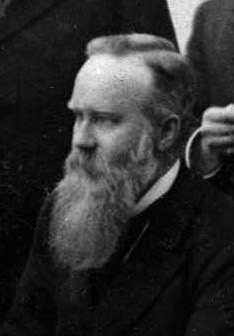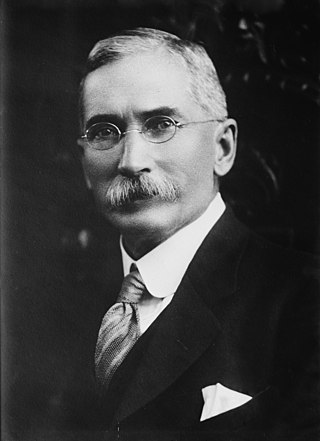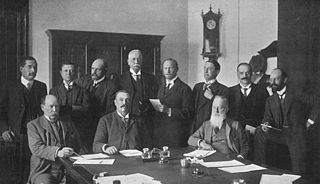Related Research Articles

The Union of South Africa was the historical predecessor to the present-day Republic of South Africa. It came into existence on 31 May 1910 with the unification of the Cape, Natal, Transvaal, and Orange River colonies. It included the territories that were formerly a part of the South African Republic and the Orange Free State.

South Africa is divided into nine provinces. On the eve of the 1994 general election, South Africa's former homelands, also known as Bantustans, were reintegrated, and the four existing provinces were divided into nine. The twelfth, thirteenth and sixteenth amendments to the Constitution of South Africa changed the borders of seven of the provinces.



Abraham Fischer was a South African statesman. He was the sole Prime Minister of the Orange River Colony in South Africa, and when that ceased to exist joined the cabinet of the newly formed Union of South Africa.

General James Barry Munnik Hertzog, better known as Barry Hertzog or J. B. M. Hertzog, was a South African politician and soldier. He was a Boer general during the Second Boer War who served as the third prime minister of the Union of South Africa from 1920s 1930s Throughout his life he encouraged the development of Afrikaner culture, determined to prevent Afrikaners from being influenced by British culture.
The Senate was the upper house of the Parliament of South Africa between 1910 and its abolition from 1 January 1981, and between 1994 and 1997.
The Unionist Party was a pre-apartheid South African political party, which contested elections to the Union of South Africa parliament from the 1910 South African general election until its merger into the South African Party just before the 1921 South African general election.
The South African Party was a political party that existed in the Union of South Africa from 1911 to 1934.

General elections were held in South Africa on 15 September 1910 to elect the 121 members of the House of Assembly. They were the first general election after the Union of South Africa was created on 31 May 1910.
Het Volk was a Transvaal political party, established in May 1904 under the leadership of Louis Botha and his deputy Jan Smuts. Upon the creation of the Union of South Africa in May 1910, it merged with Afrikaner Bond, the South African Party, and the Orangia Unie, the dominant political parties of the Cape Colony and Orange River Colony, creating the pan-Union South African Party.

The South Africa Act 1909 was an Act of the Parliament of the United Kingdom, which created the Union of South Africa from the British Cape Colony, Colony of Natal, Orange River Colony, and Transvaal Colony. The Act also made provisions for potentially admitting Rhodesia as a fifth province of the Union, but Rhodesian colonists rejected this option in a referendum held in 1922. The Act was the third major piece of legislation passed by the British Parliament with the intent of uniting various British colonies and granting them some degree of autonomy. Earlier, the British North America Act, 1867 had united three colonies and the Commonwealth of Australia Constitution Act, 1900 had united the Australian colonies.

Sir Cornelius Hermanus Wessels was a South African statesman.
Although the Democratic Alliance of South Africa in its present form is fairly new, its roots can be traced far back in South African political history, through a complex sequence of splits and mergers.
The Afrikaner Bond was founded as an anti-imperialist political party in 19th century southern Africa. While its origins were largely in the Orange Free State, it came to have a significant presence across the region, and especially in the Cape Colony and the Transvaal.

The South African Party was a political party in Cape Colony.
The Progressive Party of the Cape Colony was a political party in the Cape Parliament that was primarily composed of and supported by white immigrants to the Cape. It supported pro-imperialist policies, and was in power from 1900 until 1908.

The Parliament of the Cape of Good Hope functioned as the legislature of the Cape Colony, from its founding in 1853, until the creation of the Union of South Africa in 1910, when it was dissolved and the Parliament of South Africa was established. It consisted of the House of Assembly and the legislative council.

The National Convention, also known as the Convention on the Closer Union of South Africa or the Closer Union Convention, was a constitutional convention held between 1908 and 1909 in Durban, Cape Town and Bloemfontein. The convention led to the adoption of the South Africa Act by the British Parliament and thus to the creation of the Union of South Africa. The four colonies of the area that would become South Africa - the Cape Colony, Natal Colony, the Orange River Colony and the Transvaal Colony - were represented at the convention, along with a delegation from Rhodesia. There were 33 delegates in total, with the Cape being represented by 12, the Transvaal eight, the Orange River five, Natal five, and Rhodesia three. The convention was held behind closed doors, in the fear that a public affair would lead delegates to refuse compromising on contentious areas of disagreement. All the delegates were white men, a third of them were farmers, ten were lawyers, and some were academics. Two-thirds had fought on either side of the Second Boer War.

The first election for the South African Senate took place as a result of the creation of the Union of South Africa through the South Africa Act 1909. The Act included special provisions for the selection of the first elected Senators. The Union Parliament was prohibited from changing the arrangements for the Senate during its first ten years.
References
- ↑ "ORANGIA-UNIE Inventory of documents". 10 June 2018 – via scholar.ufs.ac.za.
{{cite journal}}: Cite journal requires|journal=(help) - ↑ Beck, Roger B. (10 June 2000). The History of South Africa. Greenwood Publishing Group. ISBN 9780313307300 – via Google Books.
